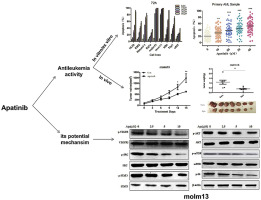当前位置:
X-MOL 学术
›
Exp. Cell Res.
›
论文详情
Our official English website, www.x-mol.net, welcomes your feedback! (Note: you will need to create a separate account there.)
Apatinib exhibits cytotoxicity toward leukemia cells by targeting VEGFR2-mediated prosurvival signaling and angiogenesis.
Experimental Cell Research ( IF 3.7 ) Pub Date : 2020-02-29 , DOI: 10.1016/j.yexcr.2020.111934 Manman Deng 1 , Jie Zha 1 , Haijun Zhao 1 , Xian Jia 2 , Yuanfei Shi 1 , Zhifeng Li 1 , Guo Fu 2 , Lian Yu 3 , Zhihong Fang 1 , Bing Xu 1
Experimental Cell Research ( IF 3.7 ) Pub Date : 2020-02-29 , DOI: 10.1016/j.yexcr.2020.111934 Manman Deng 1 , Jie Zha 1 , Haijun Zhao 1 , Xian Jia 2 , Yuanfei Shi 1 , Zhifeng Li 1 , Guo Fu 2 , Lian Yu 3 , Zhihong Fang 1 , Bing Xu 1
Affiliation

|
OBJECTIVE
Vascular permeability contributes to disease progression and drug resistance in hematological malignancies, including AML. Thus, targeting angiogenic signaling is a promising treatment strategy, especially for relapsed and resistant AML. The aim of this study was to evaluate the efficacy of apatinib, a novel receptor tyrosine kinase inhibitor that selectively targets VEGFR2.
METHODS
Several AML cell lines were exposed to various concentrations of apatinib, and then CCK8 and Annexin V/PI assays were performed to determine IC50 values and apoptosis, respectively. The effect of apatinib against primary AML cells from 57 adult patients and 11 normal controls was also analyzed utilizing an apoptosis assay. Next, we tested the underlying mechanism of apatinib in AML using western blotting and mass cytometry (CyTOF). Finally, the activity of apatinib against tumor growth and angiogenesis was further evaluated in vivo in xenograft models.
RESULTS
We found apatinib significantly inhibited growth and promoted apoptosis in AML cell lines in vitro. Similarly, apatinib showed cytotoxicity against primary AML cells but didn't affect normal BMMCs. Its effect was highly correlated with several clinical features, such as NPM1 mutation, extramedullary infiltration, relapsed/refractory disease, and M2 and M5 FAB subtypes. In addition, apatinib suppressed AML growth and attenuated angiogenesis in xenograft models. Mechanistically, apatinib-induced cytotoxicity was closely associated with inhibition of the VEGFR2-mediated Src/STAT3 and AKT/mTOR pathways and induction of mitochondria-mediated apoptosis.
CONCLUSION
Apatinib exerts antileukemia effects by targeting VEGFR2-induced prosurvival signaling and angiogenesis, thus providing a rationale for the application of apatinib in AML.
中文翻译:

阿帕替尼通过靶向VEGFR2介导的生存信号和血管生成,对白血病细胞具有细胞毒性。
目的血管通透性有助于血液恶性肿瘤(包括AML)的疾病进展和耐药性。因此,靶向血管生成信号是一种有前途的治疗策略,尤其是对于复发和耐药的AML。这项研究的目的是评估apatinib的功效,apatinib是一种选择性靶向VEGFR2的新型受体酪氨酸激酶抑制剂。方法将几种AML细胞系暴露于不同浓度的apatinib,然后进行CCK8和Annexin V / PI测定,分别测定IC50值和凋亡。还使用凋亡测定法分析了阿帕替尼对57名成年患者和11名正常对照的原代AML细胞的作用。接下来,我们使用蛋白质印迹和质谱分析法(CyTOF)测试了apatinib在AML中的潜在机制。最后,在异种移植模型中进一步评估了阿帕替尼抗肿瘤生长和血管生成的活性。结果我们发现阿帕替尼在体外显着抑制AML细胞系的生长并促进其凋亡。同样,阿帕替尼显示出对原代AML细胞的细胞毒性,但不影响正常的BMMC。它的作用与几种临床特征高度相关,例如NPM1突变,髓外浸润,复发/难治性疾病以及M2和M5 FAB亚型。此外,阿帕替尼抑制异种移植模型中的AML生长并减弱血管生成。从机理上讲,阿帕替尼诱导的细胞毒性与抑制VEGFR2介导的Src / STAT3和AKT / mTOR途径以及诱导线粒体介导的凋亡密切相关。
更新日期:2020-03-02
中文翻译:

阿帕替尼通过靶向VEGFR2介导的生存信号和血管生成,对白血病细胞具有细胞毒性。
目的血管通透性有助于血液恶性肿瘤(包括AML)的疾病进展和耐药性。因此,靶向血管生成信号是一种有前途的治疗策略,尤其是对于复发和耐药的AML。这项研究的目的是评估apatinib的功效,apatinib是一种选择性靶向VEGFR2的新型受体酪氨酸激酶抑制剂。方法将几种AML细胞系暴露于不同浓度的apatinib,然后进行CCK8和Annexin V / PI测定,分别测定IC50值和凋亡。还使用凋亡测定法分析了阿帕替尼对57名成年患者和11名正常对照的原代AML细胞的作用。接下来,我们使用蛋白质印迹和质谱分析法(CyTOF)测试了apatinib在AML中的潜在机制。最后,在异种移植模型中进一步评估了阿帕替尼抗肿瘤生长和血管生成的活性。结果我们发现阿帕替尼在体外显着抑制AML细胞系的生长并促进其凋亡。同样,阿帕替尼显示出对原代AML细胞的细胞毒性,但不影响正常的BMMC。它的作用与几种临床特征高度相关,例如NPM1突变,髓外浸润,复发/难治性疾病以及M2和M5 FAB亚型。此外,阿帕替尼抑制异种移植模型中的AML生长并减弱血管生成。从机理上讲,阿帕替尼诱导的细胞毒性与抑制VEGFR2介导的Src / STAT3和AKT / mTOR途径以及诱导线粒体介导的凋亡密切相关。



























 京公网安备 11010802027423号
京公网安备 11010802027423号